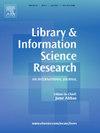ChatGPT for chatting and searching: Repurposing search behavior
IF 2.3
3区 管理学
Q2 INFORMATION SCIENCE & LIBRARY SCIENCE
引用次数: 0
Abstract
Generative AI tools, exemplified by ChatGPT, are transforming the way users interact with information by enabling dialogue-based querying instead of traditional keyword searches. While this conversational approach can simplify user interactions, it also presents challenges in structuring effective searches, refining prompts, and verifying AI-generated content. This study addresses these complexities by repurposing traditional search tactics for use in conversational AI environments, specifically to support the Searching as Learning (SaL) paradigm. Forty-five adapted tactics are introduced to aid users in defining information needs, refining queries, and evaluating ChatGPT's responses for relevance, utility, and reliability. Using the Efficient Search Tactic Identification (ESTI) method and constant comparison analysis, these tactics were mapped into a stratified model with seven categories. The framework provides a structured approach for users to leverage conversational agents more effectively, promoting critical thinking and iterative learning. This research underscores the importance of developing robust search strategies tailored to conversational AI environments, facilitating deeper learning and reflective information engagement. Additionally, it highlights the need for ongoing research into the design and evaluation of future chat-and-search systems.
用于聊天和搜索的ChatGPT:重新利用搜索行为
以ChatGPT为例的生成式人工智能工具,通过支持基于对话的查询而不是传统的关键字搜索,正在改变用户与信息交互的方式。虽然这种对话方式可以简化用户交互,但它也在构建有效的搜索、精炼提示和验证人工智能生成的内容方面提出了挑战。本研究通过将传统搜索策略重新用于会话人工智能环境来解决这些复杂性,特别是支持搜索即学习(SaL)范式。本文介绍了45种适当的策略,以帮助用户定义信息需求、精炼查询和评估ChatGPT的响应的相关性、实用性和可靠性。利用高效搜索策略识别(ESTI)方法和持续比较分析,将这些策略映射成一个包含7类策略的分层模型。该框架为用户提供了一种结构化的方法来更有效地利用会话代理,促进批判性思维和迭代学习。这项研究强调了开发针对会话人工智能环境的强大搜索策略的重要性,促进了更深入的学习和反思信息参与。此外,它还强调了对未来聊天和搜索系统的设计和评估进行持续研究的必要性。
本文章由计算机程序翻译,如有差异,请以英文原文为准。
求助全文
约1分钟内获得全文
求助全文
来源期刊

Library & Information Science Research
INFORMATION SCIENCE & LIBRARY SCIENCE-
CiteScore
4.60
自引率
6.90%
发文量
51
期刊介绍:
Library & Information Science Research, a cross-disciplinary and refereed journal, focuses on the research process in library and information science as well as research findings and, where applicable, their practical applications and significance. All papers are subject to a double-blind reviewing process.
 求助内容:
求助内容: 应助结果提醒方式:
应助结果提醒方式:


